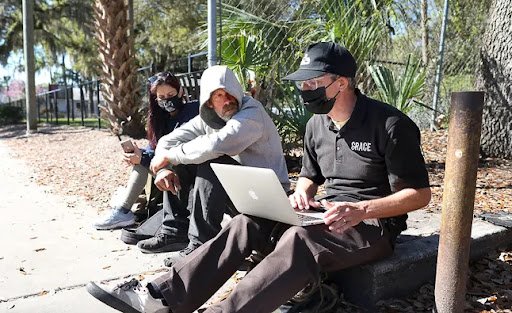A Call to Action: Homelessness and Social Justice in Gainesville
Image Courtesy: Strike UF
Gainesville has a housing problem.
As students at the University of Florida, it is important to pop the university bubble that often prevents us from seeing the bigger picture in the Gainesville community. The university plays a pivotal role in all aspects of Gainesville life, and it’s time to take accountability for our contributions — both positive and negative — to this relationship.
One key area in which the university has profoundly affected our community is the realm of housing and poverty. Our small town has a severely cost-burdened (percent of renters whose payments make up at least 50% of their total income) figure that, as of a Harvard Joint Center for Housing study compiled in 2019, is the highest of all metro areas in Florida; this is a figure which only sits at the tip of the Gainesville housing iceberg I have explored over the past few months. Numbers like this make it apparent that change is long overdue, and change begins with us.
Consider how you might personally contribute to or interact with the conditions that affect homeless people directly here in Gainesville.
“Above all, compassion and kindness are key,” said Natalie Nandelstadt, assistant to the executive director at GRACE Marketplace, when I spoke to her in February. “Greet those as you would anyone else. People just don’t want to be ignored, both by the passerby and by the system.”
While self-accountability is pivotal to changing the state of homelessness, keeping informed about said state and the systems which maintain it is just as important. In the same vein, it is also crucial that we demand and work meaningfully toward crucial shifts to the status quo, many of which were highlighted in conversations with local homelessness-and-poverty-focused organizations, namely: expanded access to public transport, inclusive and affordable housing, rent controls, and slowing of new student off-campus housing developments.
Here is some context.
Beyond the renting costs mentioned above, consider the number of homeless people in a more urban, populous county in Florida like Hillsborough; Point in Time’s 2020 count estimated 1,452 out of ~1.5 million county residents were homeless, or around .097%. With Alachua County’s population, this figure hovers closer to .24% (657/~280,000) — over two times larger. Such a discrepancy in this figure necessitates a greater response than has been seen recently, especially when access to community and health services has only worsened, if not been completely cut off as the COVID-19 pandemic runs its course.
While these numbers are alarming, hope is not lost.
Most recent surveys from Point in Time, showing a 21% decrease in Alachua County homelessness, make significant improvement evident. Such advancements can be traced back to collective community efforts such as the GRACE Marketplace. According to Nandelstadt, by providing safe emergency shelter, permanent housing, showers, hot meals, storage, case management and job training to community members in need, the organization has contributed to an overall 47% drop in Gainesville-area homelessness since its doors opened.
The statistics are alarming, but numbers are not the only cause for concern. With homelessness comes policing, which often leads to damaging interactions. During mid- and late-2021, the Gainesville city government turned to a private security contracting firm, Excelsior, to help “control” the population of homeless people in downtown Gainesville. Their time on patrol was marked with reports of excessive use of force and the city’s seizure of homeless community members’ belongings, according to WUFT News. While it is quite obvious abuses occurred, the contracting of the private firm made accountability difficult.
This instance is one of many that help to prove the deep ties between homelessness and our justice system. The two are inherently intertwined; as people come out of incarceration, they are 10 times more likely to slip into homelessness, a point that became the focus of my conversation with Kevin Scott, director of Just Income GNV, a grassroots nonprofit focused on dismantling structural poverty and spurring economic mobility.
Just Income has spearheaded a guaranteed income pilot program here in Gainesville, at first providing $300 payments during the pandemic and now providing even larger payments to over 100 low-income households with history in the justice system. Through such direct and positive community efforts with no strings attached, local lives have had a chance to be changed for the better. Scott said he believes this transformation can best continue with increased awareness at the university.
On the topic of awareness, it's time to ask ourselves a few questions.
How do you and your friends view and speak about homeless people? How do you treat them? Beyond behavior, if you feel passionate about ending homelessness and creating an environment of dignity, get involved! At the bottom of this article is a list of on-campus and off-campus local organizations that are making incredible material changes across Gainesville. A change in habit is the first step toward a change in reality, so let’s hold ourselves accountable and get to work.
If you or anyone you know is looking to contribute to the solution with action, get in touch with or donate to any of the organizations below:
Off-Campus
GRACE Marketplace: https://www.gracemarketplace.org/volunteeratgrace
St. Francis House: https://stfrancishousegnv.com/get-involved/
Community Spring: https://www.csgnv.org/
Just Income: https://jignv.org/donate
On-Campus
Circle K International @ UF: http://www.ufcki.org/
Gators Against Poverty: https://hhweek.org/locations/gator-against-poverty/
Florida Prisoner Solidarity: https://www.flprisonersolidarity.org/connect/
Strike Out,
Writer: Quinn Healy
Editor: AJ Bafer
Graphics: Dina Coletti
Gainesville




